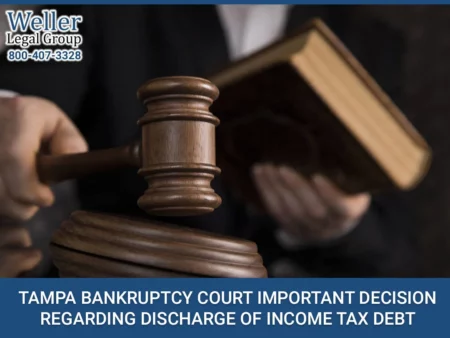 A Bankruptcy Judge in the Tampa Bankruptcy Court delivered an important decision regarding the Discharge of Income Tax Debt in Bankruptcy on August 23, 2022. The debtor filed what is referred to as an adversary proceeding seeking to Discharge numerous hundreds of thousands of dollars in tax debts. The Internal Revenue Service responded and argued that such debt should not be discharged pursuant to Bankruptcy Code 523(1)(C) based upon the premise that the debtor had willfully attempted to evade the payment of such taxes.
A Bankruptcy Judge in the Tampa Bankruptcy Court delivered an important decision regarding the Discharge of Income Tax Debt in Bankruptcy on August 23, 2022. The debtor filed what is referred to as an adversary proceeding seeking to Discharge numerous hundreds of thousands of dollars in tax debts. The Internal Revenue Service responded and argued that such debt should not be discharged pursuant to Bankruptcy Code 523(1)(C) based upon the premise that the debtor had willfully attempted to evade the payment of such taxes.
Bankruptcy Judge Williamson found, after consideration of all the evidence presented, that the debtor did not display willful behavior in his non-payment of taxes. In the instant case, although the debtor had high discretionary spending, but such spending was not deemed lavish. Additionally, the Bankruptcy Judge found that the debtor initial failure to pay the taxes was due to a mistake, that the debtor acted in good faith, and did not hide or conceal assets.
BANKRUPTCY ATTORNEY’S NOTE: Another argument sometimes raised by the IRS in such cases, is that the debtor’s failure to file his taxes in a timely manner operates as a willful attempt to evade the payment of taxes. Most courts will likely dismiss this argument. The bankruptcy code specifically states that income tax obligations are subject to discharge based upon a number of qualifications including that such debt must be at least three years due, and the relevant tax returns must have been filed at least two years before the filing of the bankruptcy. Such a rule appears to permit the discharge of such tax debts even under circumstances in which a debtor files the tax return late. Although the bankruptcy courts post 2005 will generally mandate that such returns be filed in order to qualify for a Discharge, most likely even late-filed tax returns should qualify for Discharge.
Picture Credit: VistaCreate

